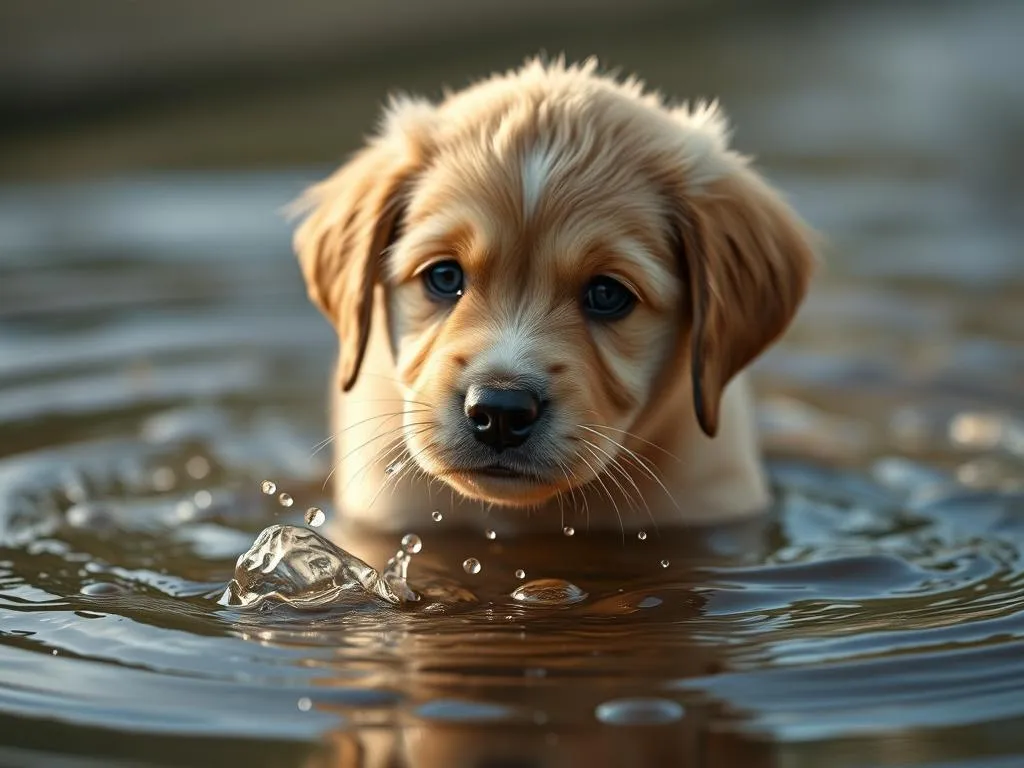
Introduction
Hydration is crucial for the health and well-being of all dogs, but it is especially vital for puppies. Puppies are growing and developing rapidly, making them more susceptible to the adverse effects of dehydration. Understanding how long a puppy can go without water is essential for every dog owner, as this knowledge helps ensure that our furry friends remain healthy and happy.
Understanding Puppy Hydration Needs
Importance of Water for Puppies
Water plays a fundamental role in various bodily functions. It aids digestion, helps regulate body temperature, and is essential for nutrient absorption. Puppies, being energetic and growing, require a consistent intake of water to support these processes. When a puppy is dehydrated, it can lead to serious health issues such as lethargy, kidney problems, and even death in extreme cases.
Factors Affecting Water Intake
Several factors can influence how much water a puppy needs:
- Age and Size: Younger puppies and smaller breeds generally require different amounts of water than older or larger dogs.
- Activity Level: More active puppies often need more water, especially after vigorous play or exercise.
- Environmental Conditions: Hot weather or high humidity can increase a puppy’s need for water.
- Diet Type: Puppies that consume dry kibble may need more water compared to those on a wet food diet, which contains a higher moisture content.
How Long Can Puppies Go Without Water?
General Guidelines
On average, a puppy can survive without water for about 3 days. However, this timeframe can vary based on the factors mentioned earlier. Unlike adult dogs, puppies are more vulnerable and may experience severe consequences of dehydration much sooner.
Signs of Dehydration in Puppies
Recognizing the signs of dehydration in puppies is crucial for their health. Some common symptoms include:
- Dry gums and nose
- Lethargy and lack of energy
- Loss of appetite
- Sunken eyes
- Excessive panting
Being able to identify these early signs can make a significant difference in preventing severe dehydration.
Comparison with Other Animals
Puppies are not the only pets that require careful attention to their hydration needs. For instance, cats also need regular water intake, but they tend to be more adept at maintaining hydration than dogs. Rabbits, on the other hand, can go longer without water but still require a continuous supply of fresh water to stay healthy.
Consequences of Dehydration
Short-Term Effects
The immediate effects of dehydration can be alarming. Puppies may become lethargic, exhibit dry gums, and lose their appetite. If you notice these signs, it is essential to address the issue quickly, as short-term dehydration can lead to more severe health concerns.
Long-Term Effects
Prolonged dehydration can result in serious health complications. Some potential long-term effects include:
- Kidney Problems: Chronic dehydration can put unnecessary stress on a puppy’s kidneys, potentially leading to long-term damage.
- Urinary Tract Infections: Insufficient water intake can result in concentrated urine, increasing the risk of urinary tract infections.
What to Do If Your Puppy Is Dehydrated
If you suspect your puppy is dehydrated, here’s a step-by-step guide to help rehydrate them:
- Assess the Situation: Check for signs of dehydration.
- Offer Water: Encourage your puppy to drink small amounts of water.
- Use Electrolyte Solutions: In some cases, specially formulated electrolyte solutions can help.
- Seek Veterinary Help: If your puppy shows severe symptoms or refuses to drink, contact your veterinarian immediately.
Ensuring Your Puppy Stays Hydrated
Daily Water Intake Recommendations
As a general guideline, puppies should drink about 1 ounce of water per pound of body weight daily. For instance, a 10-pound puppy should consume approximately 10 ounces of water each day. However, this amount can increase based on the puppy’s activity level, age, and dietary habits.
Tips for Encouraging Hydration
Keeping your puppy hydrated can sometimes be a challenge. Here are some effective methods to encourage them to drink:
- Flavored Water: Adding a little flavor, such as low-sodium chicken broth, can entice your puppy to drink more.
- Ice Cubes: Many dogs enjoy chewing on ice cubes, especially in hot weather.
- Hydration Toys: Toys designed to dispense water or hold ice can make drinking more fun for your puppy.
- Fresh and Clean Water: Always ensure that your puppy has access to fresh, clean water throughout the day.
Monitoring Water Intake
Keeping track of your puppy’s water consumption can help you identify any changes in their behavior or health. Some tools and techniques include:
- Water Bowls with Measurements: Use bowls that have measurement markings to keep track of how much water your puppy consumes.
- Daily Observations: Take note of your puppy’s drinking habits and adjust as necessary.
Additional Health Considerations
Nutrition and Hydration
The type of food your puppy consumes can significantly impact their hydration needs. Wet food often contains more moisture than dry kibble, which can help keep your puppy hydrated. If your puppy primarily eats dry food, consider mixing in some wet food or providing extra water.
Seasonal Considerations
During hot weather or after exercise, your puppy may require additional water. Always provide extra hydration during these times to ensure they stay cool and refreshed.
Puppy-Specific Needs
Different breeds may have unique hydration needs. For example, brachycephalic breeds (like Bulldogs and Pugs) may struggle more with heat and dehydration. Puppies with certain health conditions, such as kidney disease, may also have different hydration requirements. Always consult your veterinarian for tailored advice based on your puppy’s specific needs.
Conclusion
Understanding how long a puppy can go without water is vital for every dog owner. Water is essential for numerous bodily functions, and dehydration can lead to serious health problems. By ensuring that your puppy has access to fresh, clean water and monitoring their intake, you can help maintain their health and well-being. Remember to stay vigilant for signs of dehydration and consult your veterinarian for advice tailored to your puppy’s specific needs.
FAQs
What if my puppy refuses to drink water?
If your puppy is refusing to drink water, try offering flavored water or ice cubes. Ensure their bowl is clean and fresh. If they still refuse, seek veterinary advice.
Can puppies drink other liquids?
While it’s best for puppies to drink water, small amounts of low-sodium broth can be a safe alternative. Avoid giving sugary or caffeinated drinks, as they can be harmful to dogs.
How can I tell if my puppy is drinking enough water?
Monitoring your puppy’s water intake and observing their urination habits can help. A healthy puppy should urinate regularly and have a clear to light yellow urine color. If you have concerns, consult your veterinarian.









